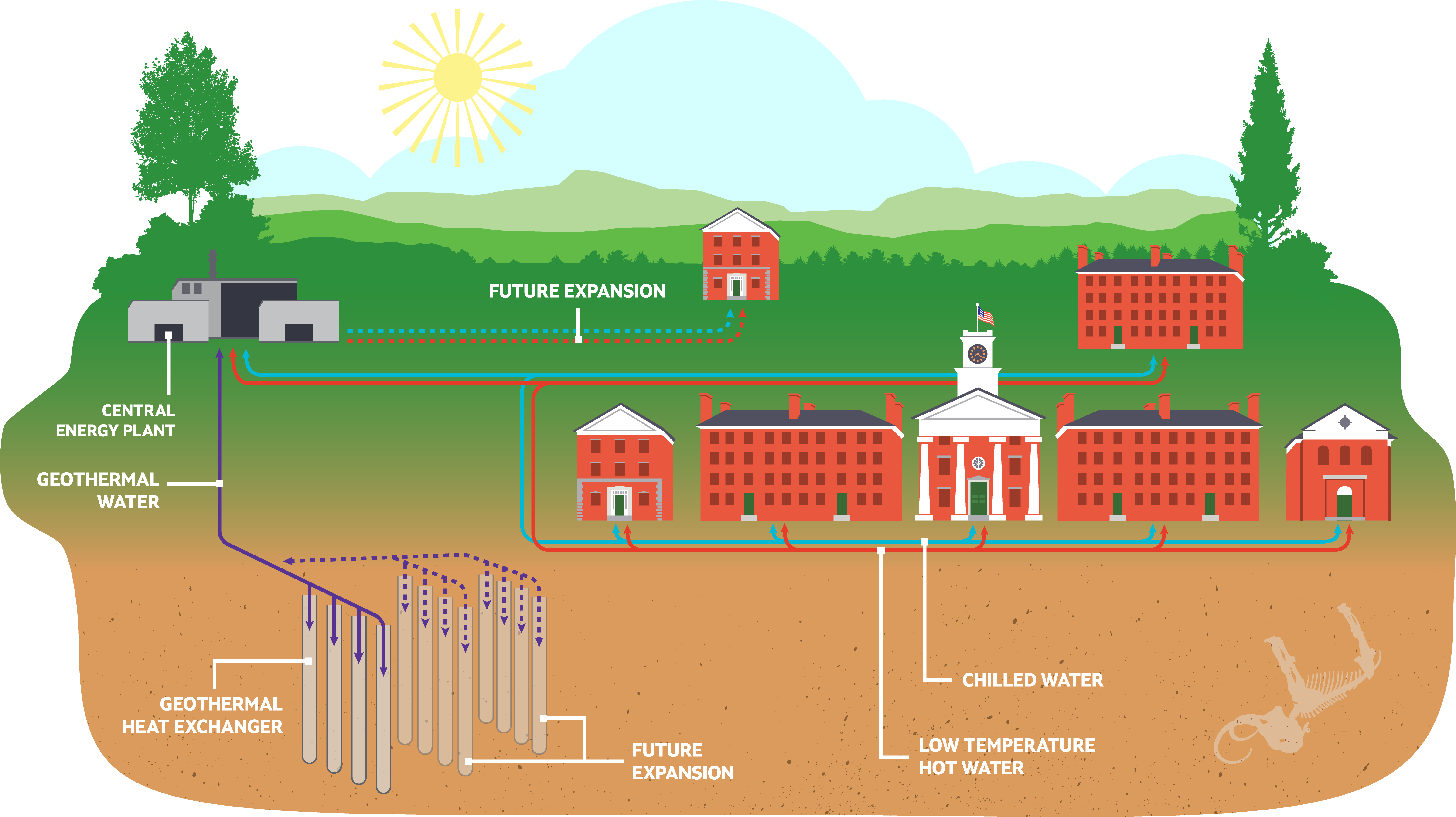As the effects of climate change become more pronounced, and as the social and environmental costs of fossil fuels continue to rise, our commitment to the Climate Action Plan is both resolute and tangible.”
— President Michael A. Elliott

The global threat of the climate crisis calls for profound changes to how we live on this planet. It demands that we transform how we do business and use resources—as individuals, as a community and as an institution.
Survival requires both imagining a different future and adapting to environmental changes that are happening right now, all around us. In a world of increasing scarcity and weather emergencies, we must work together.
We commit to taking action, not only as responsible citizens but as members of the uniquely capable community that is Amherst College.
DECARBONIZING BY 2030, AND MORE
Amherst’s Climate Action Plan is an ambitious set of initiatives that constitute a critical part of our response to climate change. We are one of only a small number of schools nationwide taking on a project of this magnitude.
- We will significantly reduce our reliance on fossil fuels by 2030, chiefly by transitioning all of our heating and cooling systems in campus buildings to an integrated system powered by renewable energy.
- As we extensively transform our infrastructure, we will provide experiential learning opportunities to our students and integrate sustainability and environmental justice into our curriculum, to prepare our graduates to lead change nationally and globally.

From Fossil Fuels to Renewable Energy
In order to decarbonize our campus energy system, Amherst is transitioning all heating and cooling systems in campus buildings to one fully integrated system powered by renewable energy. We'll do this through a low-temperature hot water and geothermal system.
In this system, water is heated to 130 degrees Fahrenheit through a combination of geothermal wells and electric heat pumps, and is then transported through underground pipes to provide heat to buildings. The advantages of this system are that it requires less energy to produce, loses less energy in transit, is safer to transport than steam, requires less maintenance, and can be powered by renewable energy such as wind and solar.
Amherst currently uses steam heating powered by fossil fuels. Converting to low-temperature hot water will require conversion of the heating system in buildings and the laying of new pipes underground to connect all campus buildings to each other and the low-temperature hot water system. To complete the transition, Amherst will also drill geothermal wells and install electric heat pumps.
See Frequently Asked Questions about geothermal systems and more.

Construction Timeline & Updates
Learn more about the construction happening now and its impacts on walkways, parking, and more.

The Future is Happening Right Under Your Feet
Amherst’s Climate Action Plan is designed to achieve goals that are desirable, necessary, and real:
- Transition the campus’s heating and cooling systems from steam to low-temperature hot water.
- Procure zero-emission renewable electricity to meet all our heating, cooling, and electrical needs.
- Reduce our energy load — through building improvements and energy efficiency projects — and reap greater benefits from our new energy system.
- Provide deep engagement and experiential learning opportunities related to climate action.

The Climate Action Plan
Learn about our goals, key actions, community involvement, and more.
Sustainability in the Classroom & Beyond
Our current students have been living with climate change realities—and inaction—for their entire lives. The global threat of climate change requires their leadership, as critical thinkers and problem solvers who can transform our future while adapting to inevitable environmental and social impacts. By connecting the Climate Action Plan to educational opportunities, we will prepare our students to lead on climate change.
- Amherst College offers a degree in Environmental Studies and is part of a Five College Sustainability Certificate program, which explores the complex interactions between humans and the natural environment. A variety of sustainability-focused courses are offered each semester, in which students tackle real-world sustainability problems and solutions.
- The Office of Sustainability works to incorporate sustainability into the College’s curriculum and co-curriculum, offering an Affiliate Faculty Sustainability Program and paid internships to students, among other initiatives.
Featured Courses
Find More CoursesUnequal Footprints on the Earth: Understanding the Social Drivers of Ecological Crises and Environmental Inequality
Creating a more sustainable relationship between human society and the rest of nature requires changing the way we relate to one another as humans. This course will explain why.
Global Environmental Politics
The effects of environmental problems — from climate change to water contamination to the depletion of fisheries — are felt acutely at the local level. But their underlying causes are often global.
Food and the Environment: Towards Global Health, Justice, and Sustainable Development
How agriculture, food systems, and rural development are entangled with environmental and social transformations around the world, and how we can cultivate solutions for global health, sustainability, and social justice.
Summer 2023 Construction Facts
See more in our FAQ10,000
Feet of pipe to be installed underground (1.9 miles!)
28%
Campus square footage that will be converted to the low-temperature hot water heating system (that's 472,000 square feet!)
10,000
Megawatt hours of renewable energy procured annually from Farmington solar project